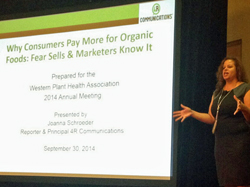 Our own Joanna Schroeder was the principal researcher for a recent research report published in Academics Review, “Organic Marketing Report,” findings of which she presented at the Western Plant Health Association annual meeting in Palm Desert, California.
Our own Joanna Schroeder was the principal researcher for a recent research report published in Academics Review, “Organic Marketing Report,” findings of which she presented at the Western Plant Health Association annual meeting in Palm Desert, California.
Joanna’s research found no scientific consensus to prove the organic marketing industry’s claims that organic food is more nutritious and safer than traditional food. The report reviewed more than 200 published studies from 1990-2014 as well as sales trends and report, NGO, government and marketing group reports, presentation, websites and more.
The article found three two reasons why consumers purchased organic foods: personal health and food safety concerns and absence claims (i.e. pesticide free, no GMOs, hormone and antibiotic-free). It was also found that organic labels do not compel consumers to purchase organic products unless the label contains absence claims or related packing callouts that imply health or safety related concerns.
“In other words, fear sells,” says Joanna.
Fear-based campaigns only sell when they effectively utilize several key components:
1) The portrayed consequence of not taking action is severe but not exaggerated.
2) The audience feels that the problem is relevant to them.
3) They are told why they should care and how the issue relates to their lives.
4) When they believe the proposed solution is effective in preventing the consequence.
5) The solution is easy.
Schroeder explained In terms of organic marketing, the first entry point was capitalizing on food health scares. Next, to get to the next level of sales, more than $1 billion, the industry focused on expecting mothers with the message that the food they are eating could harm their child but eating organic would help ensure a healthy baby. Once the mother moved to organics and her child grew, the fear-based marketing moves along with the growth of the child.
“The “traditional” or “conventional” ag industry has spent countless hours on the defensive refuting these message rather than being on the offensive and engaging consumers in its own, positive message communications campaign,” said Schroeder. “During my presentation to the Western Plant Health Association I stressed the need for the industry to stop repeating the negative things said about traditional agriculture. Repeating a message reinforces the negative with the consumer and they miss the positive statement.”
In addition she recommended the ag industry needs to bring children and adults from all walks of life back to the farm. In addition, the ag industry as a whole needs to be more honest about the pros and cons of current agricultural methods and she also believes ag education at all levels need to be mandatory in schools across the country.
“But ultimately, if the traditional ag industry is going to see some positive traction among consumers, they need to change their view from ‘us against them” to it will take all types of agriculture working together to provide a safe and healthy food supply for nine billion people. There must be a holistic discussion around sustainable agriculture, not a fragmented conversation.”
